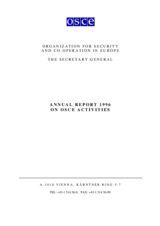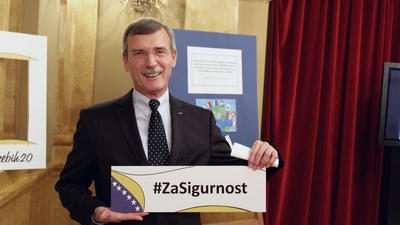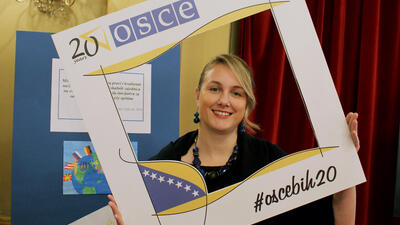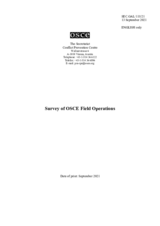About us

With its network of eight field offices, the Mission's engagement focuses on several areas of priority: democratic governance, human rights, education, the rule of law, elections, gender equality, security co-operation, and environmental issues and climate security.

Overview
The General Framework Agreement for Peace in Bosnia and Herzegovina, negotiated in Dayton, Ohio, and signed in Paris, France in late 1995, shapes the work of the OSCE Mission to Bosnia and Herzegovina. The Agreement established the Mission as one of the bodies responsible for helping to secure lasting peace in the country and thus to build a stable, secure and democratic state. The Mission’s key responsibilities are to build sustainable democratic institutions, strengthen good governance and human rights principles, and support the development of a multi-national and multi-ethnic democratic society.
Figures
The Mission's offices, staff and budget at a glance
Offices
1 Headquarters office and 8 field offices
The Mission has its headquarters in the capital Sarajevo and maintains eight field offices across the country (in Banja Luka, Brčko, Drvar, Foča, Mostar, Srebrenica, Tuzla, Travnik) as well as two satellite offices in Bihać and Livno.
Staff
296 FIXED-TERM STAFF
The Mission has 31 international and 265 local fixed-term staff (as of 31 October 2025). These figures include staff financed from extrabudgetary contributions.
Budget
€11,682,000
In 2024, the Mission operated on the basis of a Provisional Expenditure Authorization based on its 2021 Unified Budget, which amounted to €11,682,000. The extrabudgetary actual expenditure up to end October 2025 was € 2,779,330.
Leadership
Head of OSCE Mission to Bosnia and Herzegovina
History and mandate
Established in 1995 by the Ministerial Council
With an authorized staff of 233 members and with dozens of international personnel supporting it, the Mission to Bosnia and Herzegovina was the largest OSCE field operation to date. First and foremost, the Mission was given the task of supervising the preparation and conduct of free and fair elections, and of monitoring the human rights situation. Another important task was to facilitate the monitoring of arms control and confidence- and security-building arrangements. The OSCE Annual Report 1996 illustrates on pages 8 to 10 the first steps undertaken by the OSCE Mission.
The work done in the first year focused on assisting the country and its institutions and parties in creating the conditions required for holding elections. The Mission also quickly established a network of field offices and appointed observers who reported on human rights violations and the human rights situation in general in the country, with particular emphasis on election-related human rights, namely freedom of movement, freedom of expression and freedom of association.
Resources
Official OSCE documents and publications from the Mission to Bosnia and Herzegovina




















